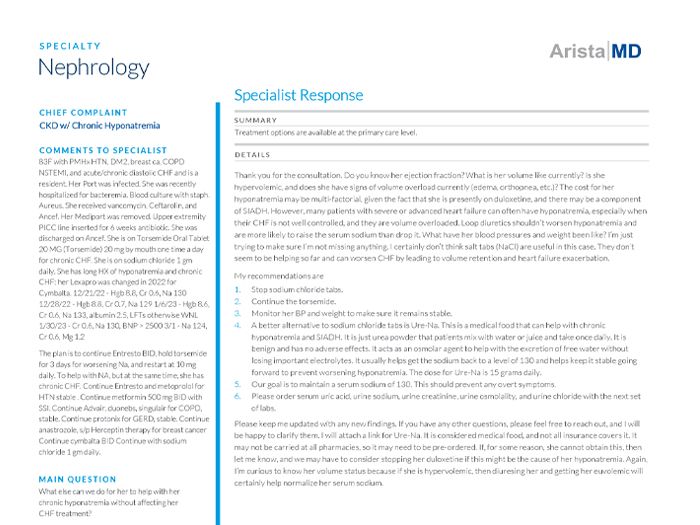Nephrology eConsult
CKD with Chronic Hyponatremia
SPECIALTY
Nephrology
CHIEF COMPLAINT
CKD w/ Chronic Hyponatremia
COMMENTS TO SPECIALIST
83F with PMHx HTN, DM2, breast ca, COPD NSTEMI, and acute/chronic diastolic CHF and is a resident. Her Port was infected. She was recently hospitalized for bacteremia. Blood culture with staph. Aureus. She received vancomycin, Ceftarolin, and Ancef. Her Mediport was removed. Upper extremity PICC line inserted for 6 weeks antibiotic. She was discharged on Ancef. She is on Torsemide Oral Tablet 20 MG (Torsemide) 20 mg by mouth one time a day for chronic CHF. She is on sodium chloride 1 gm daily. She has long HX of hyponatremia and chronic CHF: her Lexapro was changed in 2022 for Cymbalta. 12/21/22 – Hgb 8.8, Cr 0.6, Na 130 12/28/22 – Hgb 8.8, Cr 0.7, Na 129 1/6/23 – Hgb 8.6, Cr 0.6, Na 133, albumin 2.5, LFTs otherwise WNL 1/30/23 – Cr 0.6, Na 130, BNP > 2500 3/1 – Na 124, Cr 0.6, Mg 1.2
The plan is to continue Entresto BID, hold torsemide for 3 days for worsening Na, and restart at 10 mg daily. To help with NA, but at the same time, she has chronic CHF. Continue Entresto and metoprolol for HTN stable . Continue metformin 500 mg BID with SSI. Continue Advair, duonebs, singulair for COPD, stable. Continue protonix for GERD, stable. Continue anastrozole, s/p Herceptin therapy for breast cancer Continue cymbalta BID Continue with sodium chloride 1 gm daily.
MAIN QUESTION
What else can we do for her to help with her chronic hyponatremia without affecting her CHF treatment?
What do Providers Need to Succeed in Value-based Payment Models? Care Coordination Tools
There is a growing need for care coordination across multiple provider settings, especially among primary care practices. As many practices move towards value-based care arrangements, care coordination becomes critical for effective patient care. One way to achieve coordinated care is through the use of referral management tools and eConsults. These tools have been proven to effectively manage care transitions and ensure patients receive the appropriate care.
Before we dive into the benefits of referral management tools and eConsults, it is important to understand the need for coordinated care. Between hospital stays, primary care visits, specialist appointments, and other healthcare-related services, patients may be seen by multiple providers. Each provider may have different goals and be unaware of what the other providers do. This lack of coordination can lead to the following:
- Fragmented care that drives up costs.
- Requests for unnecessary or duplicate imaging lab work and tests.
- Delayed care that delivers poor outcomes for the patient.
When care coordination fails, the cost to the US healthcare industry is more than $27.2 billion. To avoid this, healthcare providers must work as a team and communicate effectively to provide optimal patient care.
eConsults
eConsults, or digital health consultations, are a type of asynchronous telehealth that allows primary care providers (PCPs), including nurse practitioners and physician assistants, to consult with specialists in real time. With eConsults, PCPs can send electronic consultations to specialists and receive feedback within a predetermined timeframe. This allows providers to quickly receive specialist input, reducing the need for in-person consultations and ultimately saving time and resources. Additionally, eConsults can help reduce wait times for specialist appointments, providing more timely patient care.


